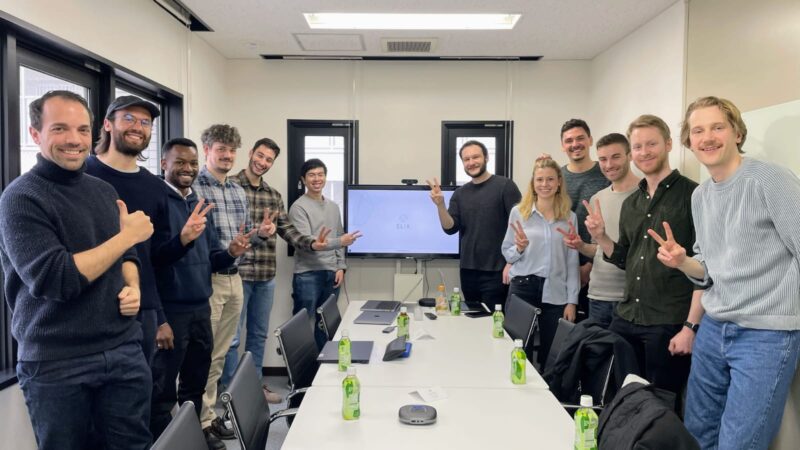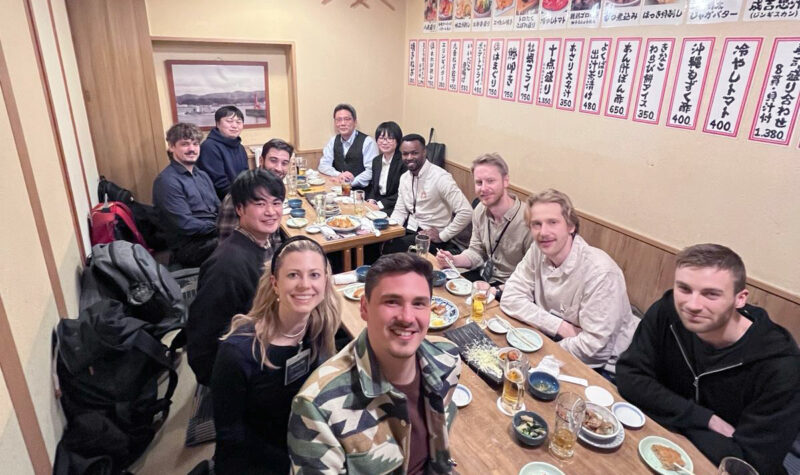In March 2024 a group of WASP PhD students from Chalmers University of Technology and Lund University, specializing in AI for healthcare, molecular dynamics, and control theory, organized a study trip to Tokyo, Japan, to gain new perspectives on the theoretical and practical aspects of their research.
The study trip was organized by PhD students Juan Viguera Diez and Christopher Kolloff, both from Chalmers University of Technology.
Juan and Christopher summarize their experiences:
“This study trip offered an opportunity for PhD students to explore the collaboration between Japanese industry and academia, particularly in AI for Science, including AI for drug discovery and healthcare. The goal was to deepen the knowledge and skills while expanding professional networks. By interacting with researchers and potential collaborators in Japan, we aimed to establish valuable connections that could benefit our diverse yet interrelated PhD projects.”
Inspired by entrepreneurs
The group started their trip with a visit a RIKEN (Health Data Deep Learning) where they learned about lab automation, the algorithms powering robot scientists, and the iteration of these robots in real-life labs.
The trip continued to Elix Inc, a startup company focusing on drug discovery with AI algorithms.
“During the visit we got inspired by the entrepreneurial spirit of this startup that in a few years went from mostly working with computer vision projects to developing a platform for drug development. We also got new perspectives on how a small company tackles challenges such as access to data and standing out from competitors.”
The WASP PhD students visited TeamLab Planets to learn how technology, in particular AI, can be used to develop artistic creation. They also visited Recursive AI, a startup company focusing on sustainability.

Visit at Elix Inc.
Valuable connections
During the last two days the focus was on discussions and networking.
The group visited the researchers Yasuhiro Matsunaga, RIKEN (Machine Learning for Molecular Dynamics) and Hiroshi Fujisaki, Nippon Medical School (Protein Dynamics). After inspiring presentations and discussions, a dinner was organized to be able to network with students in their research groups.
The final day brought the group to Hitachi:
“Upon our arrival, we were warmly welcomed by our hosts – Marnith Peng and Rieko Otsuka – who initiated the day with an introductory session before guiding us on a tour of the lab’s offices and facilities. In a demo session, we gained an in-depth look into Hitachi’s pioneering efforts in human-technology interaction within consumer products. After acquainting them with our research interests briefly, we delved into an exploration of the varied project domains Hitachi is focusing on. Among these was a project on explainable AI in learning personalized care solutions for the elderly.”
During the evening the WASP PhD students visited Koji Tsuda’s lab, specializing in AI-based drug design, applications of quantum computing to AI for Science, and multimodal machine learning for molecules.
“We had inspiring presentations and discussions, which will likely result in future collaborations.”
“In conclusion the trip was a great opportunity to establish valuable connections, deepen our knowledge and receive new insights. It was a great professional and personal experience for all of us.”

Dinner with Yasuhiro Matsunaga, Hiroshi Fujisaki and his PhD and master students from Nippon Medical School.


